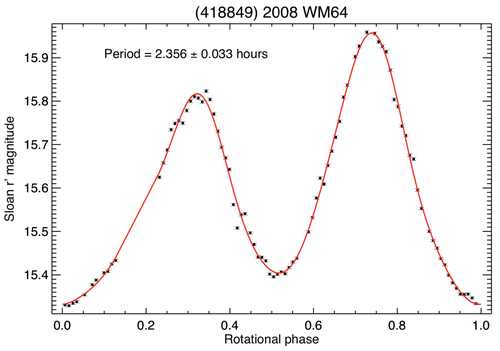Light curves and spin rates of Earth co-orbital asteroids
- 1Armagh Observatory, Armagh, United Kingdom of Great Britain and Northern Ireland (galin.borisov@armagh.ac.uk)
- 2Institute of Astronomy and National Astronomical Observatory, Bulgarian Academy of Sciences, Sofia, Bulgaria (gborisov@astro.bas.bg)
- 3INAF - Osservatorio Astronomico di Torino, Torino, Italy
- 4INAF - Osservatorio Astrofisico di Arcetri, Florence, Italy
The so-called Earth co-orbitals are asteroids that share Earth’s orbit and are potentially linked to leftover material from the formation of the rocky planets. They are difficult to observe from the ground, because of their low conjunction frequency. Here we present light curves of a number of co-orbitals successfully observed during very narrow visibility periods when they approach the Earth. We used the FoReRo2 instrument attached on the 2-m RCC telescope at the Bulgarian National Astronomical Observatory - Rozhen. The figure shows the light curve of (418849) 2008 WM64, which has a semi-major axis a=1.005 AU, an orbital period of 1.01 yr and absolute magnitude H=20.6.

Knowing their spin rate and determining the magnitude of the YORP and Yarkovsky effects we can make inferences about their creation (YORP-induced fission of a parent body) and their past orbital evolution.
Acknowledgements
Work reported here was supported via grant ST/R000573/1 from the UK Science and Technology Facilities Council (STFC). Astronomical research at the Armagh Observatory and Planetarium is grant-aided by the Northern Ireland Department for Communities (DfC).
How to cite: Borisov, G., Christou, A., Bagnulo, S., Cellino, A., and Dell'Oro, A.: Light curves and spin rates of Earth co-orbital asteroids, Europlanet Science Congress 2020, online, 21 September–9 Oct 2020, EPSC2020-324, https://doi.org/10.5194/epsc2020-324, 2020

